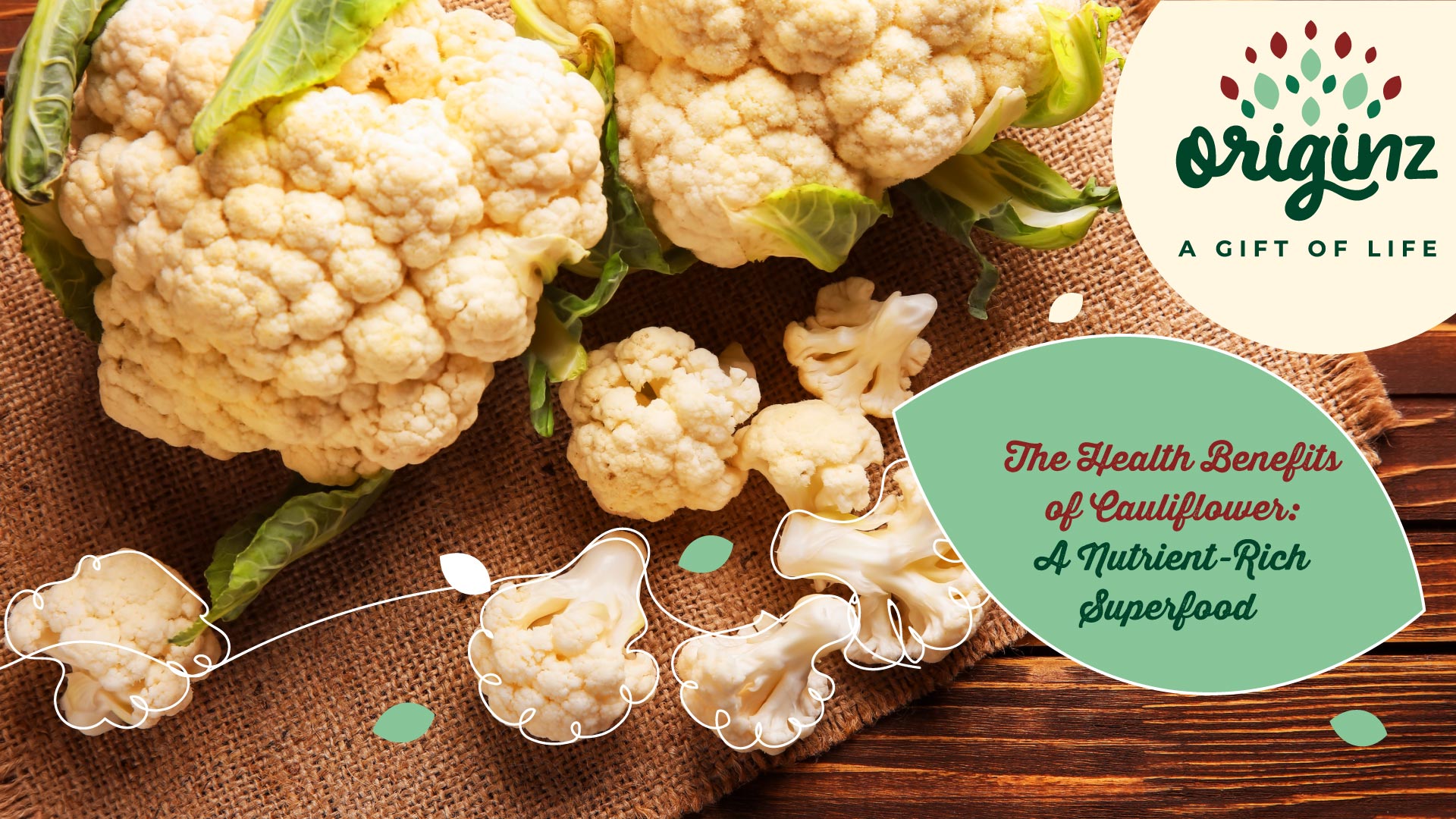
The Health Benefits of Cauliflower: A Nutrient-Rich Superfood
In the realm of nutritious vegetables, cauliflower stands out as a versatile and nutrient-packed superfood. With its crisp texture and neutral flavour, cauliflower has become a favourite ingredient in various culinary creations. Beyond its culinary appeal, this vegetable boasts an impressive array of health benefits, making it a valuable addition to any diet.
Cauliflowers, like broccoli, are known as cruciferous vegetables. Some key differences between broccoli and cauliflower include their appearance and taste. Cauliflowers are generally white, whereas broccoli is often green. Cauliflower’s taste is mildly sweet, while broccoli is more earthy and savoury. There are many differences between them, but both are highly nutritious for your body and mind.
The health benefits of cauliflower are rooted in its rich nutritional profile, making it stand out among vegetables. Packed with essential vitamins, minerals, and antioxidants, cauliflower offers a myriad of advantages for overall well-being. One cannot overlook cauliflower nutritional value, as it encompasses a diverse range of nutrients that contribute to various aspects of health.
One of the prominent health properties of cauliflower is its role in supporting digestive health. Cauliflower is a good source of dietary fibre, which aids in promoting regular bowel movements and preventing constipation. The fibre content in cauliflower also supports a healthy gut microbiome, fostering the growth of beneficial bacteria that contribute to optimal digestive function. Including cauliflower in your diet can be a tasty and effective way to enhance your digestive well-being.
Moreover, the benefits of cauliflower vegetable extend to its potential in supporting weight management. With its low-calorie content and high fibre density, cauliflower can be a satisfying addition to meals, helping to control hunger and reduce overall calorie intake. As a nutrient-dense option, cauliflower provides essential vitamins and minerals without adding excessive calories, making it a valuable ally in achieving and maintaining a healthy weight.
The cauliflower vitamins play a crucial role in supporting various bodily functions. Cauliflower is a rich source of vitamin C, an antioxidant that helps protect cells from damage, supports the immune system, and promotes healthy skin. Additionally, it contains vitamin K, which is essential for blood clotting and bone health. This diverse array of cauliflower vitamins contributes to a well-rounded nutritional profile that supports overall health and vitality. There are many health benefits of cauliflower vegetable, but in order to reap the best rewards for your body, consider choosing organic foods – organic cauliflower may have a higher nutrient content than non-organic due to its growing methods.
When exploring the types of cauliflower available, it's fascinating to note the variety within this cruciferous vegetable family. From the traditional white cauliflower to colorful varieties such as purple and orange, each type offers its unique set of nutrients and antioxidants. Embracing a spectrum of cauliflower colours ensures a more diverse intake of beneficial compounds, further enhancing the health benefits of cauliflower.
Beyond its nutritional content, cauliflower contains phytochemicals, such as glucosinolates, which have been associated with potential anti-cancer properties. While more research is needed to fully understand the extent of cauliflower's cancer-fighting abilities, incorporating this cruciferous vegetable into a balanced diet may contribute to a proactive approach to health.
Cauliflower's versatility in the kitchen makes it easy to incorporate into various dishes. Whether roasted, steamed, mashed, or riced, cauliflower adapts to different cooking methods, adding a nutritious boost to meals. Its neutral flavour makes it a versatile canvas for various seasonings and sauces, allowing for endless culinary creativity while reaping the health benefits of cauliflower.
In conclusion, the health properties of cauliflower make it a standout superfood in the realm of nutrition. With its rich cauliflower nutritional value, diverse vitamins, and potential cancer-fighting properties, cauliflower deserves a prominent place on your plate. Embrace the different types of cauliflower to enjoy a spectrum of nutrients, and explore various cooking methods to savor the versatility of this cruciferous gem. Elevate your health and well-being by embracing cauliflower as a nutrient-rich and delicious addition to your diet.
FAQs
How can cauliflower be incorporated into a child's diet?
Cauliflower can be disguised in dishes like mashed potatoes or blended into soups, making it an excellent way to introduce this nutritious vegetable to children who may be picky eaters.
Can cauliflower be eaten raw?
Yes, cauliflower can be eaten raw and is often used in salads or served with dips. It has a crunchy texture and a mild, slightly sweet flavour.
What role does cauliflower play in weight management?
Cauliflower is low in calories and high in fiber, making it a satisfying addition to meals. Its nutrient density aids in controlling hunger and supporting weight management. For more information on weight-loss diets, consult a dietitian.
How can I use cauliflower in the kitchen?
There are many ways to use cauliflower in your cooking, from stir-fries to soups. You can roast them to bring out the flavours that much more, or purée them with other vegetables to make a vegetable mash. For more inspiration, look to the selection of delicious recipes available on the Originz website!
Further Read,
Legumes: Types and Health Benefits
Pine Nuts: Uses and Health Benefits
Do Lentils Help with Weight Loss? Benefits and Varieties
Latest Blogs

Maintaining Healthy Habits After Ramadan
Have Ramadan healthy meals after Ramadan and maintain healthy food habits and implement them in your daily lives. Read more about healthy food habits.

Authentic Middle Eastern Iftar Meals to Prepare This Ramadan
Prepare some authentic middle eastern iftar meals this Ramadan. Look for fresh Ramadan food ideas and make your day memorable with these dishes. Check them out.

Ramadan Dishes to Cure Fasting Fatigue
Don’t worry about fasting fatigue anymore as we have listed some best Ramadan dishes and easy iftar meals to support your fasting journey. Check them out.

Eid-al-Fitr Feast: Delicious Recipes to Celebrate the End of Ramadan
Celebrate the end of Ramadan with delicious recipes on the eve of Eid ul Fitr. Read more about the traditional Ramadan recipes and make them easily.